英国文学史上-The 18th Century:Enlightenment
18世纪英国文学
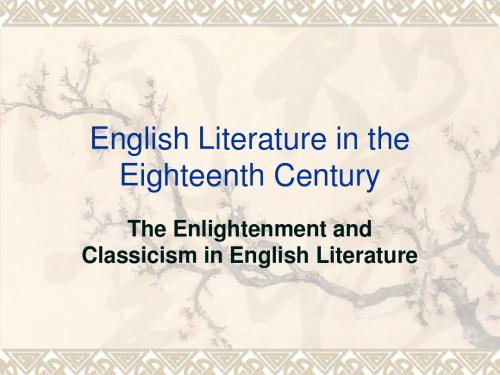
The neoclassicists have their artistic ideas: order, logic, symmetry, restraint, good taste, good sense, decorum and so on. In drama, they follow the three unities closely.
Prose should be precise, direct and flexible.
The 18th century is an age of Reason, an age of elegance and an age of classicism.
The
enlighteners celebrated reason or rationality, equality & science. They called for a reference to order, reason & rules & advocated universal education. Famous among the great enlighteners in England were those great writers like John Dryden, Alexander Pope & so on.
The English Enlighteners
The English enlighteners of the 18th century strove to bring it to an end by clearing away the feudal ideas with the bourgeois ideology.
(完整)英国文学简答题
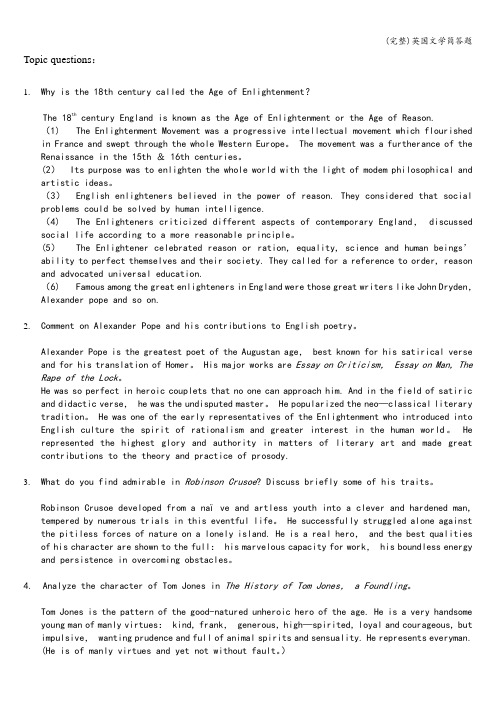
Topic questions:1.Why is the 18th century called the Age of Enlightenment?The 18th century England is known as the Age of Enlightenment or the Age of Reason.(1) The Enlightenment Movement was a progressive intellectual movement which flourished in France and swept through the whole Western Europe。
The movement was a furtherance of the Renaissance in the 15th & 16th centuries。
(2) Its purpose was to enlighten the whole world with the light of modem philosophical and artistic ideas。
(3)English enlighteners believed in the power of reason. They considered that social problems could be solved by human intelligence.(4) The Enlighteners criticized different aspects of contemporary England, discussed social life according to a more reasonable principle。
(5)T he Enlightener celebrated reason or ration, equality, science and human beings’ ability to perfect themselves and their society. They called for a reference to order, reason and advocated universal education.(6) Famous among the great enlighteners in England were those great writers like John Dryden,Alexander pope and so on.ment on Alexander Pope and his contributions to English poetry。
The 18th Century Literature 英国文学史 新古典主义时期18世纪的英国文学
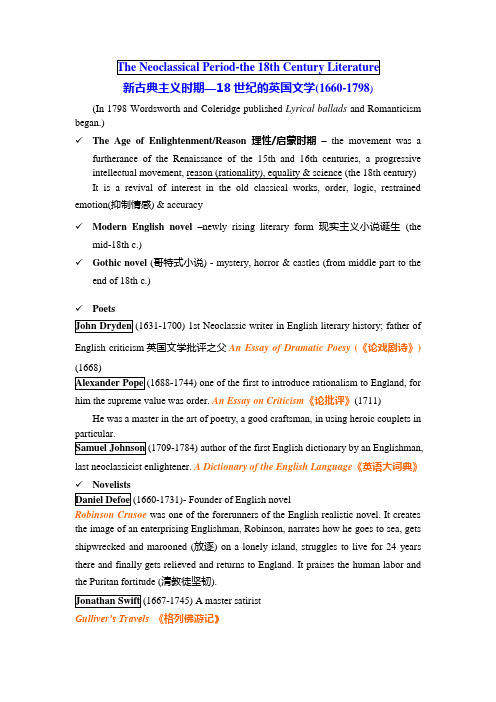
新古典主义时期—18世纪的英国文学(1660-1798)(In 1798 Wordsworth and Coleridge published Lyrical ballads and Romanticism began.)✓The Age of Enlightenment/Reason理性/启蒙时期–the movement was afurtherance of the Renaissance of the 15th and 16th centuries, a progressive intellectual movement, reason (rationality), equality & science (the 18th century) It is a revival of interest in the old classical works, order, logic, restrained emotion(抑制情感) & accuracy✓Modern English novel–newly rising literary form现实主义小说诞生(themid-18th c.)✓Gothic novel (哥特式小说) - mystery, horror & castles (from middle part to theend of 18th c.)✓PoetsEnglish criticism英国文学批评之父An Essay of Dramatic Poesy (《论戏剧诗》) (1668)him the supreme value was order. An Essay on Criticism《论批评》(1711)He was a master in the art of poetry, a good craftsman, in using heroic couplets in particular.last neoclassicist enlightener. A Dictionary of the English Language《英语大词典》✓NovelistsRobinson Crusoe was one of the forerunners of the English realistic novel. It creates the image of an enterprising Englishman, Robinson, narrates how he goes to sea, gets shipwrecked and marooned (放逐) on a lonely island, struggles to live for 24 years there and finally gets relieved and returns to England. It praises the human labor and the Puritan fortitude (清教徒坚韧).Gulliver’s Travels《格列佛游记》It offers people an opportunity for self-scrutiny. In his opinion, human nature is seriously and permanently flawed. The book is one of the most effective and devastating criticisms and satires of all aspects in the then English and European life.Lilliput(小人国),Brobdingnag(大人国), Flying Island(飞岛)& Houyhnhnm(智马国)(1707-1754)- Father of English novelH e was the first to write a “Comic epic in prose” (散文体的滑稽史诗), the firstto give the modern novel its structure and style. He adopted “the third-person narration”.He, a combination of novelist, playwright, and satirist, political pamphleteer, sees the novel as a vehicle for moral inculcation, a mirror and an imitation of nature and life.The History of Tom Jones, a Foundling《弃儿汤姆·琼斯》is a masterpiece on the subject of human nature, which brings the author the name of the “Prose Homer”✓Prose writersand write character sketches and use conversational styles, correspondences in essays. English familiar essay featured with humor, intimacy and elegance was shown first in The Tatler and The Spectator.SentimentalismDiscontented with reason, sentimentalists resort to emotion, to “the human heart”. Sentiment serves as a means of achieving happiness and social justice.(1700-1748) The Seasons in blank verse (1740)Night Thoughts in blank verseThe Task in blank verseTo Simplicity, The Passion, To Eveningleader of sentimental poetry, “The Graveyard School”(墓园诗人)Elegy Written in a Country Churchyard 《墓畔哀歌》reflects on death,the sorrows of life, and the mysteries of human life with a touch of his personal melancholy. He sympathized for the poor and the unknown, but mocks the great ones who despise the poor and bring havoc (破坏) on them.Pre-Romanticism雕刻家)Songs of Innocence《天真之歌》:a happy and innocent world from a child’s point of viewSongs of Experience《经验之歌》: a world of misery, poverty, disease, war and repression with a melancholy (忧郁的) tone from an adult’s point of view.(1759-1796)He is a master of the old Scottish tradition. He used Scottish dialect, English and a medley of the two to write poems. He is the poet of the people.A Red Red Rose expresses the noblest and sweetest human sentiment.Auld Lang Syne eulogizes friendship。
英国文学简史 4新古典主义(18世纪)
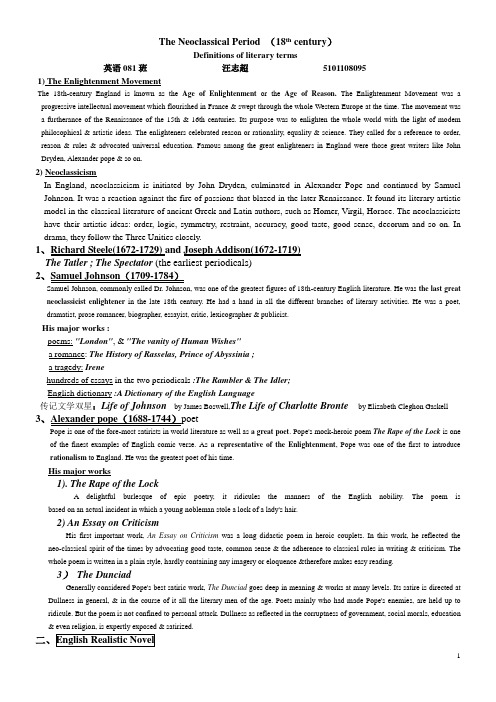
The Neoclassical Period (18th century)Definitions of literary terms英语081班汪志超51011080951) The Enlightenment MovementThe 18th-century England is known as the Age of Enlightenment or the Age of Reason.The Enlightenment Movement was a progressive intellectual movement which flourished in France & swept through the whole Western Europe at the time. The movement was a furtherance of the Renaissance of the 15th & 16th centuries. Its purpose was to enlighten the whole world with the light of modem philosophical & artistic ideas. The enlighteners celebrated reason or rationality, equality & science. They called for a reference to order, reason & rules & advocated universal education. Famous among the great enlighteners in England were those great writers like John Dryden, Alexander pope & so on.2) NeoclassicismIn England, neoclassicism is initiated by John Dryden, culminated in Alexander Pope and continued by Samuel Johnson. It was a reaction against the fire of passions that blazed in the later Renaissance. It found its literary artistic model in the classical literature of ancient Greek and Latin authors, such as Homer, Virgil, Horace. The neoclassicists have their artistic ideas: order, logic, symmetry, restraint, accuracy, good taste, good sense, decorum and so on. In drama, they follow the Three Unities closely.1Richard Steele(1672-1729) and Joseph Addison(1672-1719)The Tatler ; The Spectator (the earliest periodicals)2Samuel Johnson(1709-1784)Samuel Johnson, commonly called Dr. Johnson, was one of the greatest figures of 18th-century English literature. He was the last great neoclassicist enlightener in the late 18th century. He had a hand in all the different branches of literary activities. He was a poet, dramatist, prose romancer, biographer, essayist, critic, lexicographer & publicist.His major works :poems: "London", & "The vanity of Human Wishes"a romance: The History of Rasselas, Prince of Abyssinia ;a tragedy: Irenehundreds of essays in the two periodicals :The Rambler & The Idler;English dictionary :A Dictionary of the English Language传记文学双星:Life of Johnson by James Boswell,The Life of Charlotte Bronte by Elizabeth Cleghon Gaskell3Alexander pope(1688-1744)poetPope is one of the fore-most satirists in world literature as well as a great poet. Pope's mock-heroic poem The Rape of the Lock is one of the finest examples of English comic verse. As a representative of the Enlightenment, Pope was one of the first to introduce rationalism to England. He was the greatest poet of his time.His major works1). The Rape of the LockA delightful burlesque of epic poetry, it ridicules the manners of the English nobility. The poem isbased on an actual incident in which a young nobleman stole a lock of a lady's hair.2) An Essay on CriticismHis first important work, An Essay on Criticism was a long didactic poem in heroic couplets. In this work, he reflected the neo-classical spirit of the times by advocating good taste, common sense & the adherence to classical rules in writing & criticism. The whole poem is written in a plain style, hardly containing any imagery or eloquence &therefore makes easy reading.3)The DunciadGenerally considered Pope's best satiric work, The Dunciad goes deep in meaning & works at many levels. Its satire is directed at Dullness in general, & in the course of it all the literary men of the age. Poets mainly who had made Pope's enemies, are held up to ridicule. But the poem is not confined to personal attack. Dullness as reflected in the corruptness of government, social morals, education & even religion, is expertly exposed & satirized.The Realistic Novel:The mid-century was, however, predominated by a newly rising literary form, the modern English novel, which, contrary to the traditional romance of aristocrats, gives a realistic presentation of life of the common English people. This-the most significant phenomenon in the history of the development of English literature in the eighteenth century - is a natural product of the Industrial Revolution & a symbol of the growing importance & strength of the English of the growing importance & strength of the English middle class, Among the pioneers were Daniel Defoe ,Samuel Richardson, Henry Fielding, Laurence Sterne, Tobias George Smollett, & Oliver Goldsmith.1Daniel Defoe(1660-1731)He acquired a pure naked English—smooth, easy, almost colloquial. Yet never coarse. He loved short, crisp, plain sentences. There is nothing artificial in his language; it is really common English.作品:1)Pamphlet: The Trueborn Englishman—A Satire.(It contained a caustic exposure of the aristocracy and the tyranny of the church.)2)Novels:Robinson Crusoe(The character of Robinson Crusoe is representative of the English bourgeoisie atthe earlier stage of its development.); Captain Singleton; Moll Flanders; Colonel Jacque2Jonathan Swift (1667-1745)He is an Irish. Swift is one of the greatest masters of English prose. His language is simple, clear and vigorous. He said, “Proper words in proper places, makes the true definition of a style.” Swift is a master of satirist, and his irony is deadly. But his satire is masked by an outward gravity, and an apparent calmness conceals his bitter irony. This makes his satire all the more powerful, as shown in his Modest Proposal.作品:1)Two stories: A Tale of a Tub; The Battle of the Books(The two stories made him well-known as a satirist.)2) Novel:Gulliver’s Travels3) Pamphlets :The Drapier’s Letters; A Modest Proposal(Swift’s pamphlets in Ireland form avery important part of his works.)3Samuel Richardson(1689-1761)His main achievement as a novelist lies in his technique to show characters as personalities. Psychological analysis.作品:Pamela (The story is a told in a series of letters from the heroine, Pamela Andrews.书信体小说);Clarissa; Sir Charles Grandison.Pamela was a new thing in three ways:Firstly, it discarded the “improbable and marvellous”accomplishment of the former heroic romances, and pictured the life and love of ordinary people.Secondly, its intension was to afford not merely entertainment but also moral instruction. Thirdly, it described not only the sayings and doings of the characters but also their secret thoughts and feelings. It was, in fact, the first English psycho-analytical novel.4Henry Fielding(1707-1754)1)简介:As a novelist, Fielding is very great. He is the founder of the English realistic novel and sets up the theory of realism in literary.“Nature herself,” i.e., the exact observation and study of real life, was the basis of Fielding’s work. Byron, in a famous phrase, called Fielding “the prose Homer of Human Nature”. Fielding established once for all the form of the modern novel. His importance in the history of the novel is unique. He has been rightly call the “father of the English novel”.2)作品:Novels:①Joseph Andrews ②Jonathan Wild ③Tom Jones(流浪汉小说) ④AmeliaPicaresque Novel(流浪汉小说)is a popular sub-genre of prose fiction, which is usually satirical and depict in realistic and humorous details the adventures of a roguish hero of low social class, who lives by his or her wits in a corrupt society. The characteristic of it is loosely linked episodes, intrigue fights and adventures. The style of this novel originated in Spain and flourished in Europe in the 17th and 18th centuries, and continued to influence modern literature. In England, Tobias Smollett’s works, Daniel Defoe’s “Moll Flanders”, Fielding’s “Tom Jones”, and Charles Dickens’“Pickwick Papers” are considered to be picaresque novels. In modern America, Sawl Bellow’s “Adventure of Augie March”, Jack Kerouac’s “Dharma Bums” can be called picaresque novels. The Chinese “Journey to the Wrest” is considered to has considerable elements of picaresque.3)Some Features of Fielding’s Novels①Fielding’s method of Relating a Story: told directly by the author.②Satire in Fielding’s Novels. Satire sounds everywhere in Fielding’s works.③Fielding believed in the educational function of the novel.④Style. Fielding is a master of style. His style is easy, unlaboured and familiar, but extremely vivid and vigorous.5Tobias Smollett(1721-1771)He is a Scottish. He belonged to the realistic school.作品:Roderick Random, Peregrine Pickle, Humphry Clinker, History of England.6Laurence Sterne(1713-1768)He is a novelist of the sentimentalist school. He was born in Ireland.A Sentimental Journey.The drama of the 18th century was extensive, but very little of it has permanent or acting value. Only two men, Goldsmith and Sheridan, produced works which are of high literary quality and which are still remain their interest upon the stage.1Oliver Goldsmith(1730-1774)Goldsmith was a poet, novelist, dramatist and essayist, all combined in one person. He was born in Ireland.Comedies: The Good-Natured Man, She Stoops to Conquer2、Richard Brinsley Sheridan(1751-1816)was, like Goldsmith, an Irishman. His literary fame rests almost exclusively uponhis dramas. His dramas are sufficient to maintain his reputation as one of the most brilliant of English writers of Comedy.戏剧作品:①The Rivals, ②The School for Scandal(It gives a brilliant portrayal and a biting satire ofIn the first half of the 18 century, Pope was the leader of English poetry and the heroic couplet the fashion of poetry. But the middle of the century, however, sentimentalism gradually made its appearance.The appearance and development of sentimentalist poetry marks the midway in the transition from classicism to its opposite, Romanticism, in English poetry.Sentimentalism : It is a literary current started in the middle of 18th century. It is a part of the Pre-Romantic trend as reaction against the cold, logic rationalism that dominated people’s life and writing since the last decade of the 17th century. It appeared to sentiment as a means of achieving happiness and social justice. They believed that the effective emotions were the evidence of kindness and goodness. A ready sympathy and an inward pain for the misery of others became part of accepted social morality and ethics. Their words reveal a purely emotional approach to life on the part of the narrator. They formed the contrast of rationally composed novel. The most outstanding figure of this school was Laurence Stern who composed “Tristram Shandy”and “Sentimental Journey through France to Italy”. Samuel Richardson’s work also belong to this school because he used a lot of psychological analysis. Oliver Goldsmith’s work, especially “The Vicar of Wakefield”is of this time. Thomas Gray, a member of Graveyard school is a member of sentimental school, because Graveyard School is part of Sentimental School.1Laurence Sterne(1713-1768)He is a novelist of the sentimentalist school. He was born in Ireland.作品:Tristram Shandy, A Sentimental Journey.2Thomas Gray(1716-1771):作品:Elegy Written in a Country Churchyard. (This is a poem full of the gentle melancholy which marks all early romantic poetry.)Graveyard School: is a term applied to the 18th century poets who wrote melancholy, reflective works, often set in graveyard, on the theme of human morality. The dominant imageries are graveyard, death and darkness. They are part of Sentimental School in the 18th century literature. Thomas Gray’s “Elegy Written in a Country Churchyard” was the best known example for the time.Elegy: It is an ancient form of writing. Its tradition can be traced back to Greek. It is a kind of war song, the song that eulogizes the warring spirit, especially to celebrate the victory of the war and to lament upon the dead. Later, thiswriting is used for lamentation over one’s loss, one’s complaint, one’s unhappiness or things like that. In France, people sometimes use elegy for love lyric.3Oliver Goldsmith(1730-1774)Goldsmith was a poet, novelist, dramatist and essayist, all combined in one person. He was born in Ireland.作品:⑴Poems:①The Traveller is based on Goldsmith’s personal observation during his European wanderings. He came to the conclusion that human happiness depends less on political institution than onour own minds.②The Deserted Village is Goldsmith’s best poem. It contains some charmingdescriptions of village life. He marks the depopulation in the countryside owing to the inroads ofmonopolizing riches.⑵Novel: The Vicar of Wakefield. His novel appeals to human sentiment as a means of achieving happinessand social justice. That is why he is acknowledged to be one of the representatives of English sentimentalism.⑶Comedies: The Good-Natured Man, She Stoops to Conquer⑷Essays: The Citizen of the World.Goldsmith’s place as one of the greatest English essayists is mainlyIn the latter half of the 18century, a new literary monument arose in Europe, called the Romantic Revival. In England, this movement showed itself in the trend of Pre-Romanticism in poetry, which was ushered by Percy, Macpherson and Chatterton, and represented by Blake and Burns,the two greatest romantic poets of the 18th century.Pre-Romanticism:It rose as a reaction against enlightenment and neoclassicism, especially against reasons advocated by them. It originated by conservative groups men of letters and rose in the latter half of 18th century. The representatives are Thomas Gray, William Blake and Robert Burns.1William Blake(1757-1827)①The earliest of the major English Romantic poets.②Like Shelley, Blake strongly criticized the capitalists' cruel exploitation, saying that the "dark satanic mills left menunemployed, killed children & forced prostitution."③From childhood, Blake had a strongly visual mind; whatever he imagined, he also saw. As an imaginative poet, hepresents his view in visual images instead of abstract terms. " I know that This world is a world of IMAGINATION & Vision," & that "The Nature of my work is visionary or imaginative."④Blake writes his poems in plain & direct language.works:①The Songs of Innocence is a lovely volume of poems, presenting a happy & innocent world,though not without its evils & sufferings.②The Songs of Experience paints a different world, a world of misery, poverty, disease, war &repression with a melancholy tone.③Marriage of Heaven & Hell marks his entry into maturity.④The Book of Urizen, The Book of Los,The Four Zoas,Milton2、Robert Burns(1759-1796)He is the greatest of Scottish poets. He devoted all his free time to collecting, editing, restoring and imitating traditional Scottish songs, or writing verses of his own to traditional tunes.works:①Burns is remembered mainly for his songs written in the Scottish dialect on a variety of subjects.②Numerous are Burns’ songs of love and friendship. A Red, Red Rose③Bruce at Bannockburn is a typical song of patriotism.⑤The Tree of Liberty and A Revolutionary Lyric are the poems on the theme of revolution.⑥The Toadeater is a piece of bitter satire.⑦The Jolly Beggars is characterized by humour and lightheartedness.。
外研社英国文学史及选读_第二版__第一册教学课件Chapter 21 John Dryden
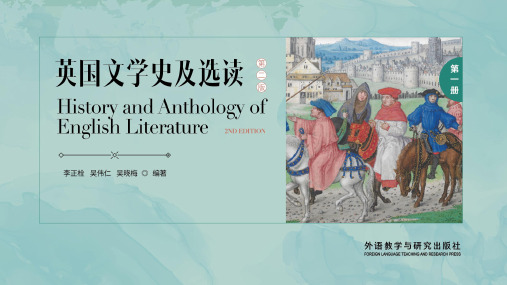
Selections
Notes
For Study and Discussion
Chapter 21 John Dryden
Life and Works John Dryden (163l–1700)
was born into an extended family of rising Puritan gentry in Northamptonshire He received education at Westminster School, under the renowned Dr Richard Busby, and later went to Trinity College, Cambridge University, where he took his BA in 1654. His early work was more striking for its political selfcontradiction than for its literary quality: within two years he wrote “Heroic Stanzas” (1659) praising Oliver Cromwell and “Astraea Redux” (1660) celebrating the Restoration of Charles II.
Chapter 21 John Dryden
Life and Works
His greatest work of literary criticism is An Essay of Dramatic Poesy (1668), which is a general defence of drama as a legitimate art form, as well as Dryden’s own defence of his literary practices.
the enlightenment

• The rising urban middle class or bourgeoisie brought the rapid development of social life
• Industrial Revolution: the beginning of larger-scale manufacturing. Britain continued to expand its colonies abroad in Asia, Africa and North America.
• The 18th-century England is known as the Age of Enlightenment or the Age of Reason.
• The Enlightenment Movement was a progressive intellectual movement which flourished in France & swept through the whole Western Europe at the time. • The movement was a furtherance of the Renaissance of the 15th & 16th centuries. • Its purpose was to enlighten the whole world with the light of modem philosophical & artistic ideas.
启蒙运动
• 启蒙运动( The Enlightenment)是18世纪欧洲思想的 主潮,欧洲资产阶级学者往往把这个思潮称为“光明观念” 运动。启蒙运动是西方资产阶级继文艺复兴之后进行的第 二次反对教会神权和封建专制的文化运动,它是文艺复兴 的继承和发展。 “启蒙”一词,原意为“照明”和 “照耀”(enlighten)。启蒙思想家主张以理性的启迪 和科学的光明去战胜经院哲学的无知和封建势力的黑暗, 照亮人们的头脑,建立“理性王国”,故有“启蒙”之称, 也即“光明观念”的含义。 启蒙运动追求政治和学术 思想上的自由,它有两大特点,一是反对宗教蒙昧主义, 宣扬理性与科学;二是反对封建专制制度,宣扬民主与法 制。
英国文学18th Century.ppt
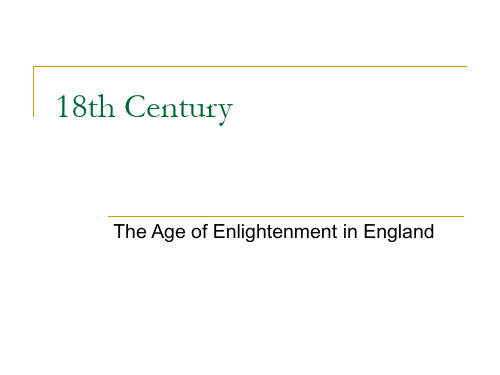
Enlightenment
The 18th century marked the beginning of an intellectual movement in Europe, known as the Enlightenment, which was, on the whole, an expression of struggle of the bourgeoisie against feudalism. The enlighteners fought against class inequality, stagnation, prejudices and other survivals of feudalism. They attempted to place all branches of science at the service of mankind by connecting them with the actual needs and requirements of people.
rapid growth of industry and commerce “cottage industry”– “factory manufacturing” the complement of the Enclosure Movement; proletariat came into being
6) Fighting the survivals of feudalism, the enlighteners, at the same time, were prone to accept bourgeois relationships as rightful and reasonable.
7) The problem of man comes to the fore in literature, they believe that man is born kind and honest, he becomes depraved only due to the influence of corrupted social environment.
18th Century英国文学
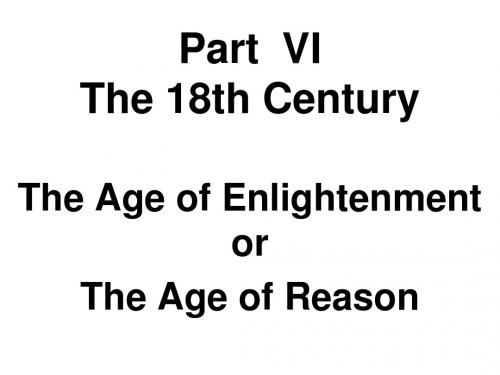
(4) Defoe, Richardson, Fielding, Sterne, Goldsmith & Smollet were among the major novelists of the time. By combining the allegorical tradition of the moral fables with the picaresque tradition of the lower-class stories, they achieved in their works both realism & moral teaching.
2. Neoclassicism
(1) The term mainly applies to the classical tendency which dominated the literature of the early period. It was, at least in part the result of a reaction against the fires of passion which have blazed in the late Renaissance, esp. in the metaphysical poetry.
(2) It found its artistic models in the classical literature of the ancient Greek & Roman writers like Homer, Virgil, Horace, Ovid, etc., and in the contemporary French writers such as Voltaire & Diderot.
- 1、下载文档前请自行甄别文档内容的完整性,平台不提供额外的编辑、内容补充、找答案等附加服务。
- 2、"仅部分预览"的文档,不可在线预览部分如存在完整性等问题,可反馈申请退款(可完整预览的文档不适用该条件!)。
- 3、如文档侵犯您的权益,请联系客服反馈,我们会尽快为您处理(人工客服工作时间:9:00-18:30)。
The 18th Century:Enlightenment(启蒙运动同时为美国独立战争与法国大革命提供了框架,并且导致了资本主义和社会主义的兴起,与音乐史上的巴洛克时期以及艺术史上的新古典主义时期是同一时期。
)1) A revival of interest in the old classical works, order, logic, restrained emotion(抑制情感) and accuracy.2) The Age of Enlightenment/Reason: the movement was a furtherance (促进、成长) of the Renaissance of the 15th and 16th centuries, a progressive intellectual movement, reason(rationality), equality&science(the 18th century)3) The 18th century in English literature is an age of prose.4) 小说崛起:In the mid-century, the newly literary form, modern English novel rised. Realistic novel现实主义小说;Gothic novel哥特式小说—mystery, horror, castles (from middle part to the end of century)Daniel Defoe丹尼尔•笛福1660~1731 P148(小说家,新闻记者,小册子作者;十八世纪英国现实主义小说的奠基人。
)He is the first writer study of the lower-class people, his language is smooth, easy, colloquial (白话通俗的) and mostly vernacular(方言的), and he is the founder of realistic novel.Works: √<Robinson Crusoe>鲁宾逊•克鲁索P149(Full name: The Life and Strange Surprising Adventure of Robinson Crusoe)It praise the fortitude (不屈不挠、勇气) of the human labor and the Puritan. Robinson grew from a naive and artless (天真朴实的) youth into a shrewd and hardened (坚定的) man, tempered(磨练)by numerous trials(考验)in his eventful life. It is an adventure story, Robinson, narrates how he goes to sea, gets shipwrecked and marooned on a lonely island, struggles to live for 24-years there and finally gets relieved and returns to England. The story may come straight from a sailor’s logbook.Figures and things mentioned:Alexander Selkirk 塞尔扣克(the story based upon his experience)Cannibals 食人者Friday (Robinson names the man Friday to commemorate the day of his rescue)Savage 野人Captive 俘虏Jonathan Swift乔纳森•斯威夫特1667~1745 P161Reference: Jonathan Swift is a master satirist in the 18th century who criticized the new bourgeois-aristocratic (资本家-贵族)society of his age.Works:1)√<Gulliver‟s Travels>格列佛游记(fictional work) Doctor Lemuel Gulliver P163①Lilliput小人国厘厘普特(船出事而冒险,后跟商船回英国)②Brobdingnag大人国勃罗白丁拉格(He is a pygmy侏儒there.)(船出事而冒险,后跟船回英国)③Flying Island (Laputa)拉普特飞岛(虚无缥缈的发明→It’s a bitter parody拙劣的模仿on scholastics and projectors.) (遇到海盗而冒险)④Houyhnhnm马岛(Good→Houyhnhnm 骏马胡已姆bad→Yahoo, they possess every conceivable evil.)2) <A Modest Proposal>一个小小的建议P181(This is made to English government to relive the poverty of Irish people )Joseph Addison约瑟夫·艾迪生1672-1719 P192(英国散文家、诗人、剧作家以及政治家。
艾迪生的名字在文学史上常常与他的好朋友理查德·斯蒂尔(Richard Steele)一起被提起,两人最重要的贡献是创办两份著名的杂志《闲谈者》(Tattler)与《旁观者》(Spectator))Works:Sir Roger at Church P196 Sir Roger at the Assizes P199 法庭上的罗杰乡绅Henry Fielding亨利•菲尔丁1707~1754 P203(英国小说家,戏剧家,被誉为“英国小说之父”)He is called “Father of English novel”. He was the first to write a“Comic epic in prose”(散文体史诗), and the first to give the modern novel its structure and style.Works:<The History of Tom Jones, a Foundling>弃婴汤姆•琼斯的故事P205Thomas Gray 托马斯•格雷1716~1771 P212Works: Elegy Written in a Country Churchyard 墓园挽歌P213Oliver Goldsmith 奥利弗•哥尔德斯密斯1728~1774 P220Works: The Vicar of Wakefield 威克菲尔德的牧师P221Richard Brinsley Sheridan理查德•布林斯利•谢里丹1751~1816 P225Works: <The Schoolfor Scandal>造谣学校P226William Blake威廉•布莱克1757~1827Reference: Romantic poetWorks: 1)<Songs of Innocence>天真之歌(A happy and innocent world from children’s eyes.2)<Songs of Experience>经验之歌(A word of misery, poverty, disease, war and repression with a melancholy(忧伤的)tone from men eyes. Include: <The Chimney Sweeper>扫烟囱的孩子P247<London>伦敦P244 <The Tyger>√老虎P245—Lamb isa symbol of peace and purity , tyger is a symbol of dread(恐惧)and violence.(《老虎》中的手法:ellipsis省略, metaphor)3)<The Marriage of Heaven and Hell>天堂与地狱的婚姻(satire, fable)Definitions of important literary terms:Symbol: Literally, something that stands for something else. In literature, any word, object, action, or character that embodies and evokes an range of additional meaning and significance.Robert Burns罗伯特•彭斯1759~1796 P248The greatest Scottish poet in the late 18th century.Works Chiefly in the Scottish Dialect:1)My Heart’s in the Highlands 我的心呀在高原P250 (patriotic one)2)John Anderson, My Jo 约翰•安徒生,我爱P251√3)A Red, Red Rose一朵红红的玫瑰P252 (hypobole, metaphor)4) To a Mouse 致小鼠P253(belongs to Poems Chiefly in Scottish Dialect主要用苏格兰方言写的诗,其中还包括→The Cotter’s Saturday Night农民星期六晚上, To a Mountain Daisy致山中雏菊, Man Was Made to Mourn悲哀的人, Address to the Devil魔鬼誓言等)5) Auld Lang Syne 友谊地久天长P255Definitions of important literary terms:1)rhyme:韵律Likeness of the terminal末端sounds of words, frequently used in versification 诗律either at the end of a line of verse or within the line.2)Rhythm:节奏Controlled or measured flow of movement, either aural 听觉的or visual, usually produced by an ordered arrangement of different elements of the medium concerned.。
